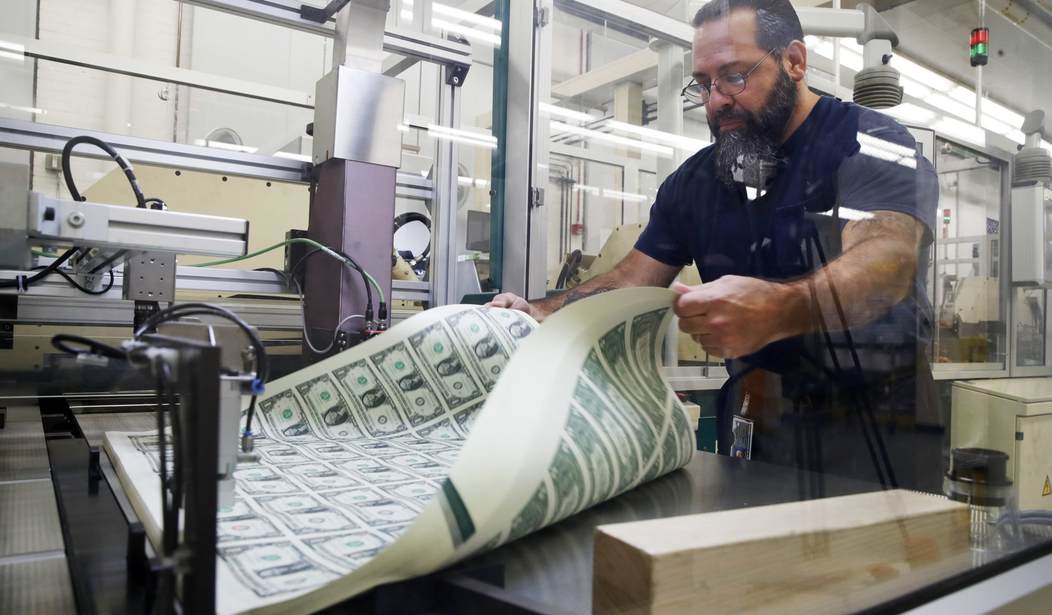A weak dollar is not an America-first dollar. It is an America-last strategy.
Of course, it isn’t at all clear whether pushing the value of the greenback down is the goal of the administration. Wall Street seems divided on the matter.
For instance, a recent report from Brown Brothers Harriman states the following: “Did U.S. Treasury Secretary Mnuchin signal a change in the U.S. dollar policy? Probably not.” The reason, BBH says, is partly because of the Treasury’s urgent need to sell a lot of debt securities, possibly more than a trillion dollars. “It beggars belief that Mnuchin was talking the dollar down, introducing new currency risk, ahead of the quarterly refunding and a significant increase in the supply of Treasuries in the months ahead,” BBH continues.
Meanwhile, Academy Securities sees it the other way. “For all intents and purposes, the ‘unofficial’ weak dollar policy became ‘official’,” states a recent Academy report. “Trump’s view on trade is simple. We want to export more. A weak dollar means more exports. Therefore, weaken the dollar.”
Still, the dollar is down against the world’s major currencies such as the British pound, the euro, and the Japanese yen. Since late 2016 the dollar index has lost more than 12 percent, according to data from the St. Louis Federal Reserve. That drop could be for a variety of reasons unconnected to policy goals, such as other economies strengthening, or different interest rate expectations.
Whether or not there is such a policy, the fact remains that weakening the dollar is a bad move for the U.S. economy, for everyone who lives there and for everyone who gets paid in U.S. dollars.
Here are some key points to consider.
Beggar-thy-neighbor. If weakening the currency was the way to increase prosperity, then every country would try to do the same at each other’s expense. It would quickly become a race to the bottom that in the end would leave no country better off than at the start. The policy of competitive devaluation once got dubbed beggar-thy-neighbor because it only works at the expense of a country’s trade partners.
Dirty pool. It’s worth remembering that the goal of trade is not to shaft the other party but rather it is for both sides to benefit from the transactions.
Our trade partners will likely view such a policy as “dirty pool.” A devaluation for the sole reason of boosting exports will get seen in the same light as would surreptitiously sneaking state subsidies to exporters in the hope that the products can undercut the competition. Retaliation would likely come soon after.
A limp greenback doesn’t help exporters much. A weaker dollar may aid exporters by making the selling price of their products cheaper on the global market. But it’s a temporary benefit.
A cheaper dollar also means higher costs for raw materials such as steel, oil, and other commodities. The result is that manufacturing gets more expensive. Eventually, the rising costs whittle away any advantage made possible by the devaluation, leaving the exporters back where they were before the currency fell.
A decades-long strengthening Swiss Franc hasn’t hurt Switzerland with its exports, as Steve Hanke, professor of applied economics at The Johns Hopkins University, mentioned to me many moons ago. Quite the opposite, they’ve soared as a percentage of GDP.
The other way of looking at this is that a weak dollar hurts importers because all their costs go up. That gets passed on to consumers in the form of higher prices.
Unlegislated Tax Increase. By definition, a decline in the value of the dollar is inflation, as John Tamny, director of FreedomWorks’ Center for Economic Freedom, has mentioned to me more than once. It buys you less than it did before.
But inflation is also, in effect, an unlegislated tax increase. It decreases the spending power of anyone earning dollars and at the same time reduces the inflation-adjusted debts of the U.S. government, which owes trillions of dollars. In other words, the feds win and you lose.
A weak dollar will cause capital to flee the country. If you thought the mobility of labor was high then just watch how fast money can move.
The problem with a weaker dollar policy is that people quickly cotton on and soon dump their greenbacks in favor of other more stable currencies.
As I’ve mentioned numerous times, it’s like depositing money in a bank account where the balance immediately starts to dwindle. With rare exception, you wouldn’t put your money in such an account, and neither would anyone else.
The U.S. under a purposely weak dollar regime would see cash flee, and capitalism without capital is like a cigarette without the tobacco – just no fun at all.
The longer-term effect of less capital would be lower growth, fewer jobs, and higher inflation. That would pretty much put America in a worse place than it is now.









Join the conversation as a VIP Member